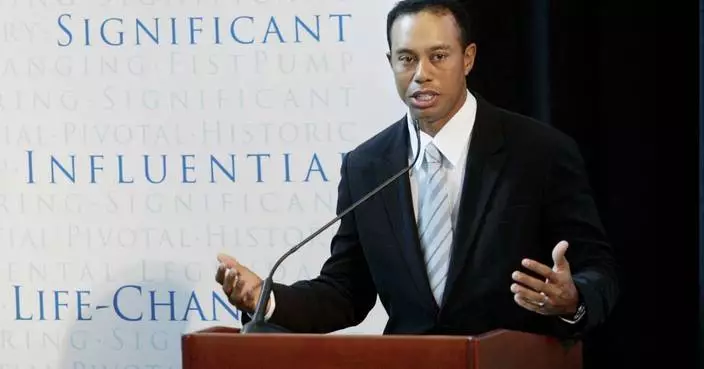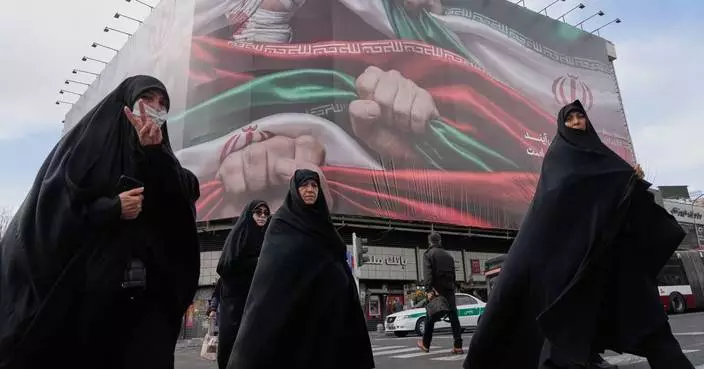FRANKFURT, Germany (AP) — The European Central Bank cut interest rates Thursday for the seventh time to counter worries about economic growth fueled by President Donald Trump’s tariff onslaught.
The bank’s move should support economic activity in the 20 countries that use the euro currency by making credit more affordable for consumers and businesses.
ECB President Christine Lagarde said at a post-decision news conference that “the major escalation in global trade tensions and the associated uncertainty will likely lower euro area growth by dampening exports."
"And it may drag down investment and consumption," she said.
The bank’s rate-setting council decided at a meeting in Frankfurt to lower its benchmark rate by a quarter percentage point to 2.25%. The bank has been steadily cutting rates after raising them sharply to combat an outbreak of inflation from 2022 to 2023.
Now that inflation has fallen, growth worries have taken center stage. The economy in the 20 countries that use the euro grew a modest 0.2% in the last three months of 2024. Inflation was 2.2% in March, close to the bank’s target of 2%.
The cut was widely expected by analysts given the sudden shadow cast over the eurozone’s growth outlook by Trump’s April 2 announcement of unexpectedly high tariffs, or import tax, on goods from other countries starting at 10% and ranging as high as 49%. The European Union faces a 20% tariff.
At the bank’s last meeting on March 6, Lagarde had raised the possibility of an upcoming “pause” in the bank’s series of rate cuts. But that option was practically eliminated by Trump’s announcement.
The bank’s benchmark steers rates throughout the economy. Lower interest rates make it less expensive to borrow money and buy goods ranging from homes to new factory equipment. That supports spending, business investment and hiring.
Trump has suspended the tariffs for 90 days, but the possibility of the 20% tariff rate he has proposed for Europe left economists and policymakers concerned that the higher costs will weigh on business activity — and lead to slower growth or even a recession if he carries through. The U.S. is Europe’s largest trade partner with some 4.4 billion euros ($5 billion) in goods and services crossing the Atlantic every day in both directions.
Uncertainty is another factor that could slow the economy since Trump’s pause for negotiations leaves it unclear where the tariff rate will actually settle. Businesses may hold off on making decisions if they don’t know what their costs will be.
European Union officials have offered Trump a “zero for zero” option that would see both sides dropping tariffs on industrial goods including cars. But Trump has said that won't be enough, and raised the possibility of Europe importing large additional quantities of US liquefied natural gas.
Economists at Berenberg bank think that by midyear some of the tariffs will be negotiated away, ending at around 12%. However that is still around 10 percentage points higher than average tariffs before Trump. in addition to that comes a separate 25% tariff on autos, aluminum and steel from all countries. The auto tariff will hit Europe’s prominent auto industry hard - and Trump has indicated it is is not up for negotiation.
Lagarde said the “cloud of uncertainty” over tariffs meant that rate decisions going forward would have to be taken on a meeting by meeting basis depending on what happens during the 90-day tariff truce.
“There is a negotiation which is ongoing, players around the tables have stated their position, proposals have been made, at least on one side, but all of that could change," she said.
"There’s a degree of unpredictability which adds to the uncertainty.”

President of European Central Bank, Christine Lagarde, arrives for a press conference after an ECB's governing council meeting in Frankfurt, Germany, Thursday, April 17, 2025. (AP Photo/Matthias Schrader)

FILE - The European Central Bank rises silhouetted against the blue sky, in Frankfurt, Germany, Thursday, March 6, 2025. (Boris Roessler/dpa via AP, File)










